(404 products available)
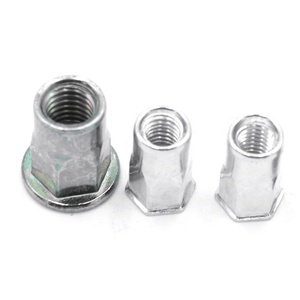

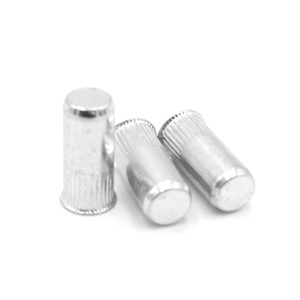




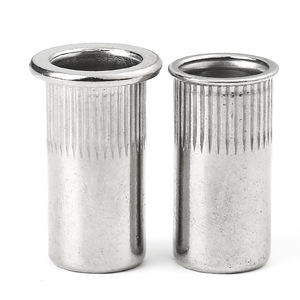








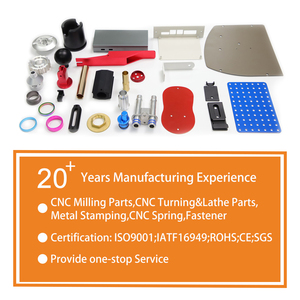















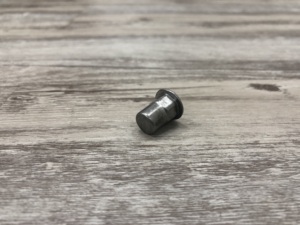







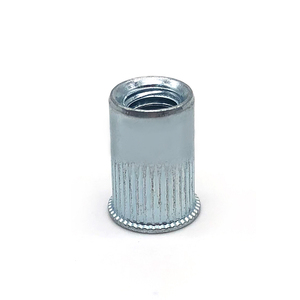

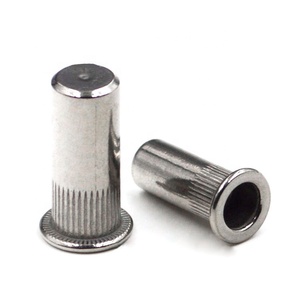


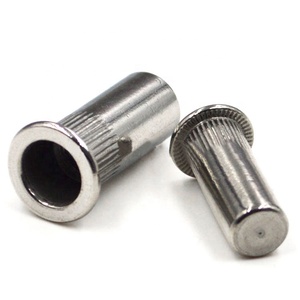












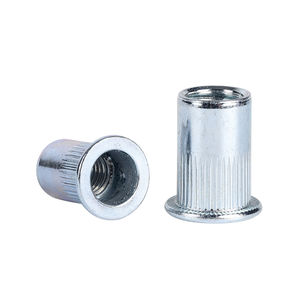

 Ready to Ship
Ready to Ship
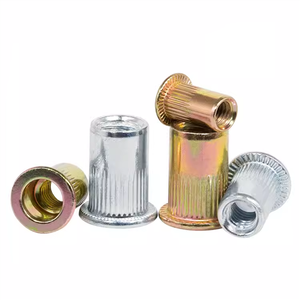
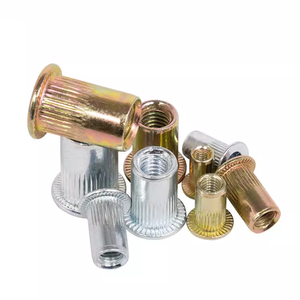


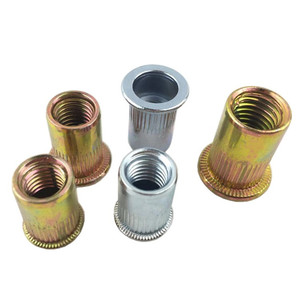




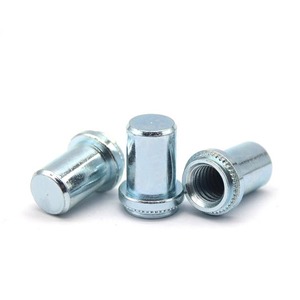
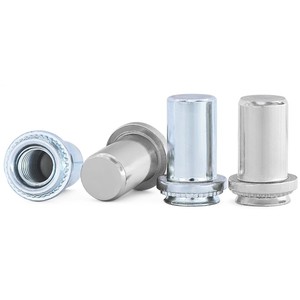


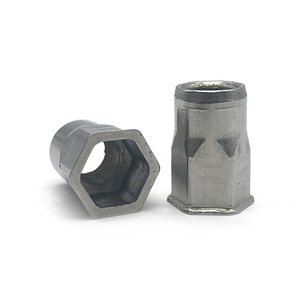




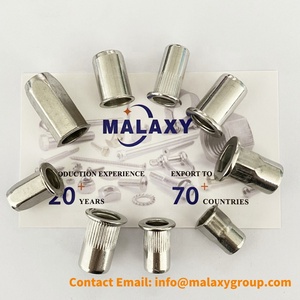
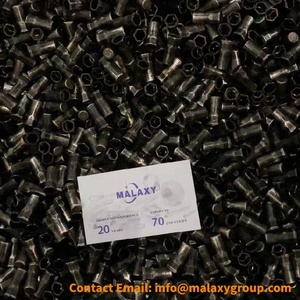














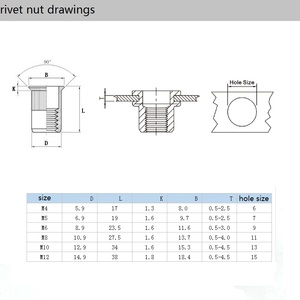
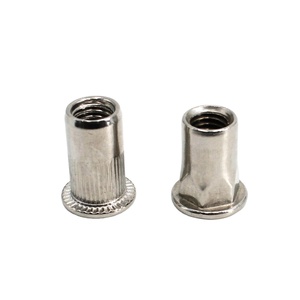













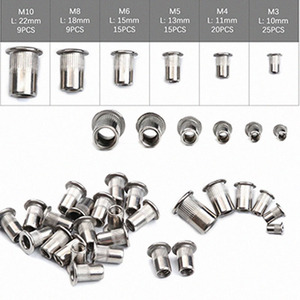


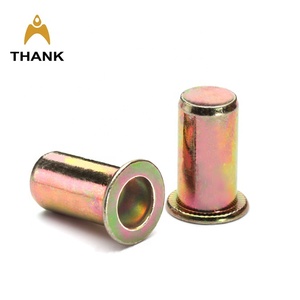







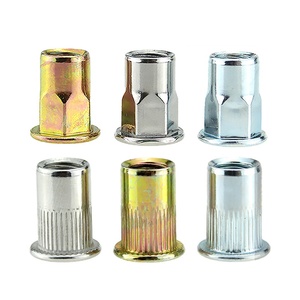

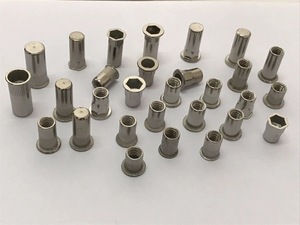
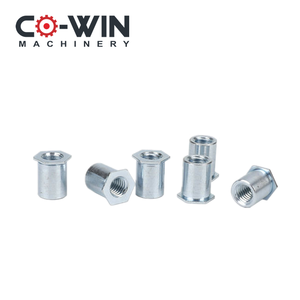







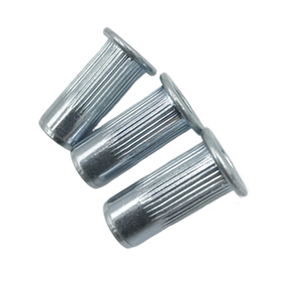












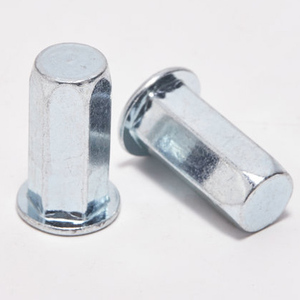


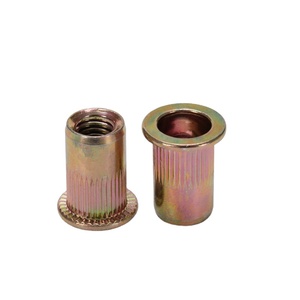









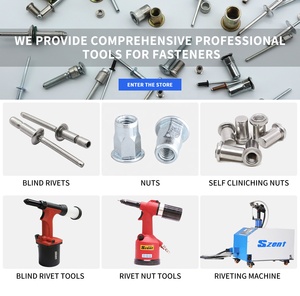



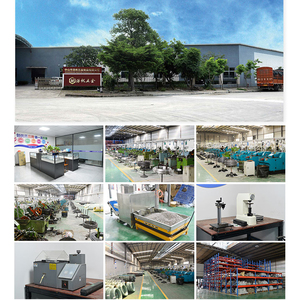

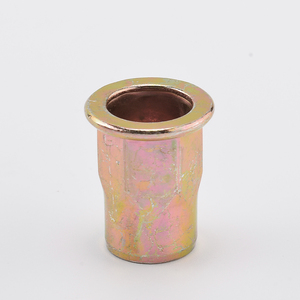






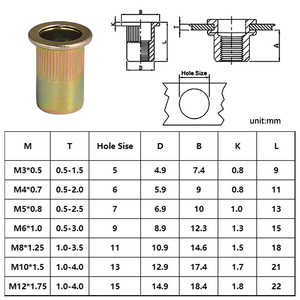
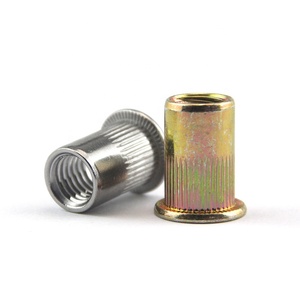














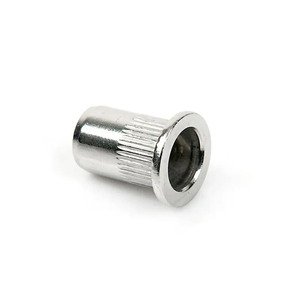
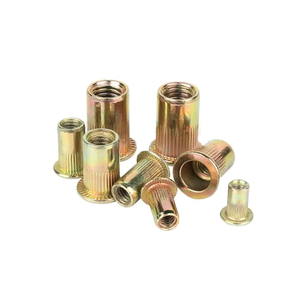

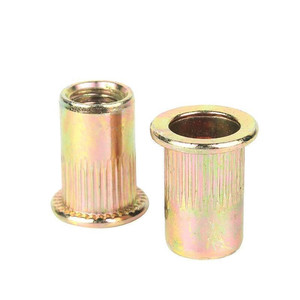


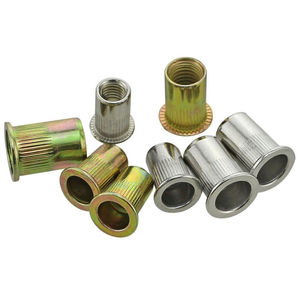



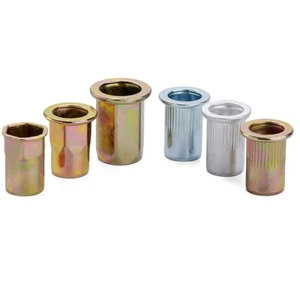






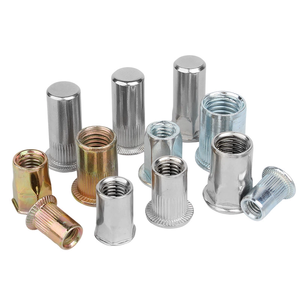
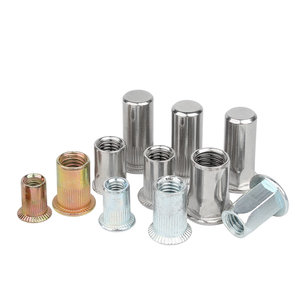
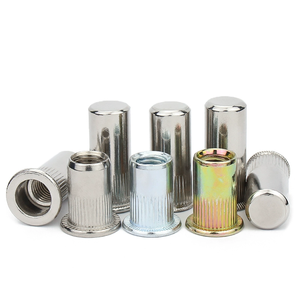


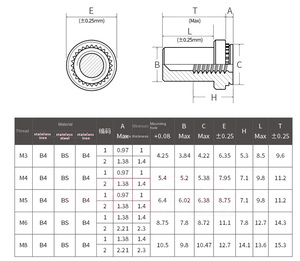
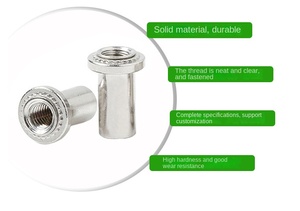
Based on materials of M6 closed-end rivet nuts, they can be classified into six types.
Stainless steel rivet nuts
The typical feature of M6 closed-end rivet nuts made of stainless steel is high strength and excellent resistance to corrosion. Stainless steel is ideal for both structural applications and surface finishing. M6 closed-end rivet nuts incorporating stainless steel are common in marine, automotive, and aerospace applications. In these demand high performance in adverse environmental conditions.
Aluminium rivet nuts
Aluminium is a popular choice for its lightweight property. This makes M6 closed-end rivet nuts appropriate for applications where minimising weight is critical. These nuts have good corrosion resistance. They are suited for use in the automotive and aerospace industries. In addition, they ensure a strong, threaded fastening in thin materials.
Brass rivet nuts
Brass M6 closed-end rivet nuts come with an attractive appearance and outstanding resistance to corrosion. These rivet nuts are especially resistant to corrosion by seawater. In addition, they are commonly used in boat building and marine hardware. In addition, they are suitable for electrical components due to brass’s non-magnetic and electrical conductivity properties.
Carbon steel rivet nuts
Carbon steel M6 closed-end rivet nuts are known for their exceptional strength and durability. These nuts’ cost-effectiveness offers excellent load-bearing capacity when used in heavy-duty applications. However, like the M10 rivet nut, they require appropriate surface treatment or coating to guard against rust and corrosion. This makes them ideal for use in environments with normal conditions.
High-strength alloy steel rivet nuts
The closing end rivet nuts are made of high strength alloy steel. They are appropriate for high-stress applications. They are engineered for enhanced hardness and wear resistance. Their application is in the automotive industry, heavy machinery, or any other structural applications where high mechanical loads are common. They are often treated or coated for enhanced corrosion resistance.
Coated steel rivet nuts
M6 closed-end rivet nuts typically feature steel coated with protective materials like zinc or nickel. These coatings provide corrosion protection. At the same time, the underlying steel offers strength. These rivet nuts are often used in construction, electronics, and outdoor equipment. These applications require both strength and resistance to corrosion.
M6 closed-end rivet nuts attach two dissimilar materials together. They feature.
Threaded insert for strong fastening
The M6 closed-end rivet nut creates a permanent, internally threaded hole in thin materials. This provides a strong and secure threaded insert for fastening bolts and screws. The rivet nut is engineered with precision to ensure consistent thread quality and load distribution. This makes it appropriate for applications where durability and reliability are critical.
Blind installation from one side
Closed-end rivet nuts offer a key advantage. They are installed in a blind hole, enabling secure fastening without access to the opposite side. This feature is particularly useful in applications with limited space or where the opposite side must remain unobstructed. Closed-end design also helps prevent foreign materials from entering the host structure. This ensures a cleaner and more secure assembly.
Versatile applications in multiple industries
The M6 closed-end rivet nut is highly popular across many fields. These include automotive, aerospace, electronics, and structural assembly. These nuts are useful for attaching components to sheet metal or other thin materials. They also provide a versatile fastening solution for diverse material combinations. M6 rivet nuts are commonly used in areas with tensile and shear strength needs.
Easy installation with standard tools
The M6 rivet nuts are installed using standard tooling. These include pneumatic or electric rivet nut guns and hand tools. This makes them easy to install, adding to their appeal for quick assembly. The ease of installation means they are employed efficiently. This reduces labour costs while producing a strong, reliable joint.
Corrosion-resistant finish
To ensure longevity in harsh environments, M6 closed-end rivet nuts are often available in various corrosion-resistant coatings. This includes zinc plating, and other anti-corrosive finishes. The nuts are suited for outdoor or moisture-prone environments. In addition, they maintain their integrity and aesthetic appearance.
The M6 closed-end rivet nut is used in the automotive, electronics, and aerospace industries. They are also popular in the construction and fabrication industries. Their uses include.
Attaching components to thin materials
The M6 closed-end rivet nuts allow the attachment of components to thin sheets of metal. This is an advantage in automotive and aerospace industries, where body panels, engine covers, and fuselage sections are made from thin metal sheets. The nuts provide a strong, threaded insert for secure fastening. This maintains structural integrity without damaging the panels.
Mounting in electronic devices
In the electronics industry, M6 closed-end rivet nuts are used for mounting circuit boards, screens, and other components within enclosures. They distribute load evenly across the surface. This prevents warping or breaking thin metals commonly used in portable electronic devices. They also offer a finished, flush surface that improves aesthetics.
Creating access points in fabrication
In metal fabrication, M6 closed-end rivet nuts create easy access points. They give access to one side of a workpiece. This allows bolts or screws to be fastened without excessive material removal. This practice is particularly helpful in maintenance or repair operations. It also saves time and resources, allowing quick disassembly or access to internal components.
Use in Exterior Construction Applications
M6 closed-end rivet nuts are employed in securing panels, trim pieces, and other accessories in construction applications. These nuts come with corrosion-resistant properties. Therefore, they are ideal for vehicle exteriors. They also withstand elements without degrading or losing adhesion or strength. This factor contributes to the finished product’s durability and long-term functionality.
Securing assemblies in structural engineering
M6 closed-end rivet nuts provide a reliable means of securing dissimilar components in structural engineering. They are useful for applications involving mixed materials. These may include metal-to-plastic or metal-to-composite joints. The nut’s closed end prevents the entry of dirt and other contaminants. This protects assembly areas from debris accumulation in critical applications.
When purchasing closed rivet nuts, buyers should check various factors that affect performance and durability. They should consider these factors. The nuts’ material and coating, such as corrosion, resistivity, and strength, are critical in securing workpieces, particularly in corrosion-prone environments. Here are the factors buyers should consider when purchasing M6 closed-end rivet nuts.
Material
The material used to compose the M6 closed-end rivet nuts affects their strength and durability. Buyers should settle for rivet nuts made from strong materials like carbon steel for heavy-duty applications. For applications where corrosion resistance is crucial, buyers should go for rivet nuts made from stainless steel or aluminium.
Coating
M6 closed-end rivet nuts with coatings like zinc or other anti-corrosive materials enhance the rivet nut’s endurance in outdoor and moisture-rich settings. Besides this, coatings improve the nuts’ aesthetic value. Other coatings improve electrical conductivity, which is crucial for electronic equipment. Select coating based on the usage environment of the rivet nuts.
Load and tensile strength
Tensile strength refers to the amount of force the rivet nut can support in a perpendicular direction to the applied nut. On the other hand, load strength refers to the ability of the rivet nuts to support forces directed perpendicular to their installed axis. Ensure the chosen rivet nuts have sufficient load and tensile strength for the intended application. This is particularly crucial for dynamic and critical heavy-load applications encountered in the automotive and aerospace industries.
Easy installation
Buyers intending to install M6 closed-end rivet nuts manually should consider installing tools and techniques. Using the proper tools will enhance the performance and durability of the nuts and ensure easy installation. Furthermore, the nuts’ heat treatment will improve the ease of manual installation and the nuts’ mechanical properties.
Size and grip range
Buyers should ensure the M6 closed-end rivet nuts size and grip range are compatible with the intended material thickness. Selecting the proper size will guarantee proper load distribution. This will promote an effective and secure connection. Avoid settling for oversized or undersized nuts. They will compromise the overall integrity of the secured assembly.
No, they are not designed to be reused. Once they are installed, they create a permanent threaded insert in the material. As such, removing the inserted screw will damage both the nut and the material. What’s more, they are designed to provide a strong and secure fastening in applications where permanent assembly is required.
Yes, they are ideal because they provide a secure attachment point without mechanical interference. This mechanically protects internal components during functioning. Furthermore, they are lightweight and easy to install. These nuts add barely any load, making them perfect for PSU enclosures and the casing of electronic devices.
Holes corresponding to the rivet nut diameter are drilled into the base material of the targeted application to install these nuts. The rivet nut is then placed into the hole, and the installing tool compresses the nut’s splines against the material. This forms a secure threaded connection. The tool used should be compatible with closed-end rivet nuts for effective installation.
The material played in constructing the nut and the nut’s design geometry primarily determine load and tensile strength. Other aspects are heat treatment and nut size. Stronger materials create rivet nuts with higher strength. Thus, they can support greater loads and more tension. Stronger rivet nuts are less likely to fail due to wear or deformation.
Storage conditions directly impact the nuts’ lifetime and performance. Store them in a dry room with stable temperatures. Avoid places with loads of humidity and extreme temperature changes. Store them in such a way that they won’t get damaged. Store them in a place with proper airflow to eliminate dust for hygiene purposes.